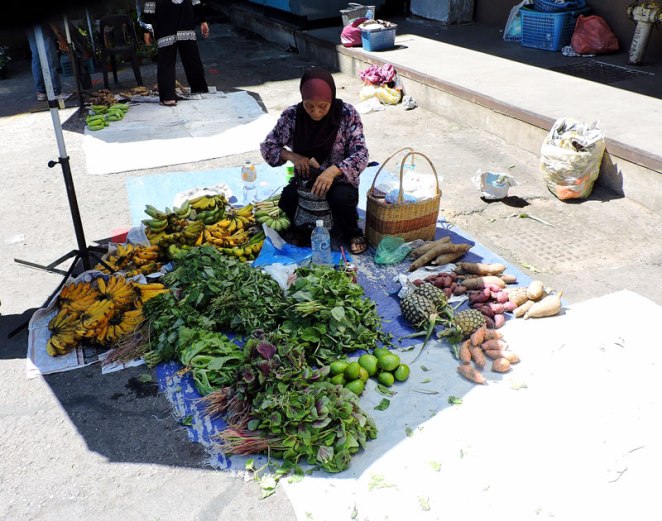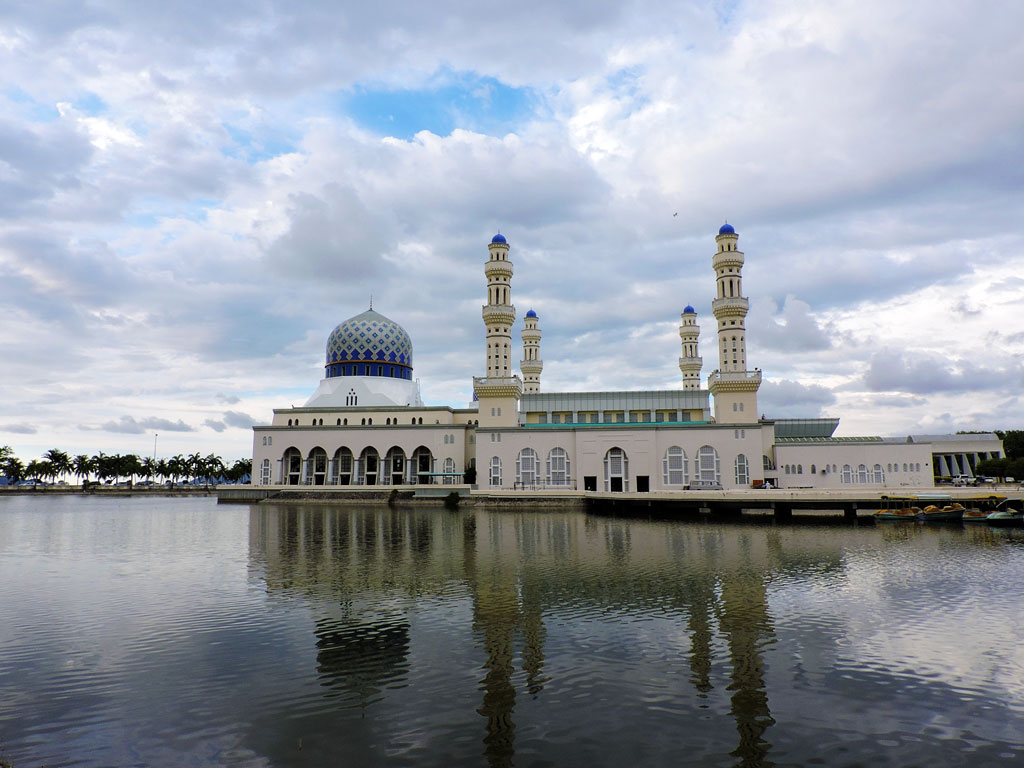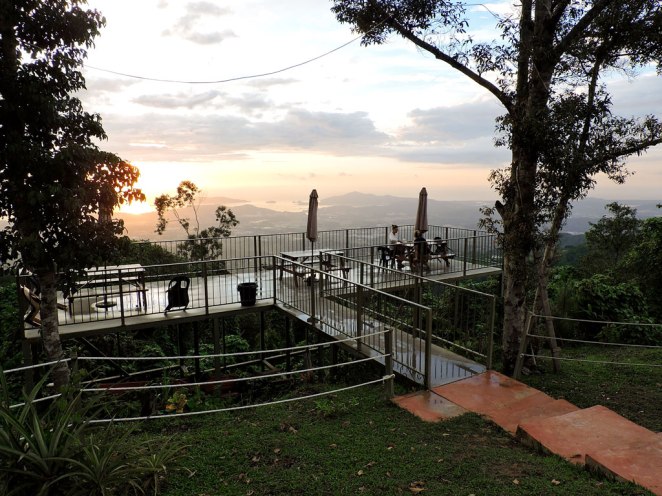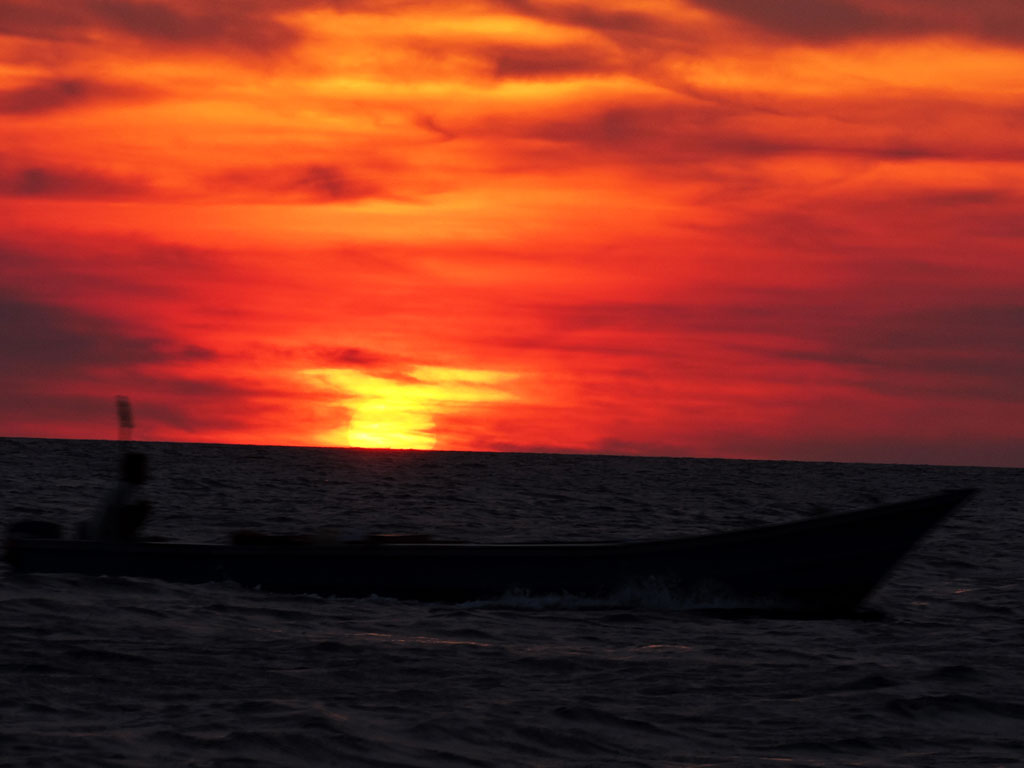
07.05.
We are back at our favorite Malaysian State Sarawak, but this time for a short period. We stop to eat at the last town of the state – Lawas. The atmosphere is more Muslim than the other towns we passed through. The people from the off-road team treat us to lunch at a very nice restaurant in otherwise not so interesting small town Lawas.
The Malaysian part of Borneo consists of two states – the huge Sarawak and the so called North Borneo, Sabah State.
The two states have had a different history before joining the Malaysian Federation in the sixties, when Brunei was also invited, but the sultan refused. The demography of the states is quite different – they are inhabited by different ethnic groups with various cultures. It is as if the states are two separate countries and the impression is fortified by the border check-point between them where one’s passport is even stamped.

Regarding Sarawak it is still our favorite place in Malaysia though it is in fact very different from the other parts of the country. For us these are the lands of Iban people, crazy tattooed guys, Christians, rich Chinese and thick jungles.

Traditional house
Sabah is more developed and populated than Sarawak and Brunei. On the road villages come one after the other, there are many crop fields, palm plantations and buildings… The scenery resembles much the east coast of West Malaysia. In almost every village there is a branch of the Sabah Catholic Church. The main ethnicity is Kadazan Dusun and like the Borneo Dayak people they love tattoos, drink rice wine, are mainly Christians and used to behead their enemies.

Old women at the market
In several hours we reach the capital of the state – Kota Kinabalu, undoubtedly the biggest and most developed city in Borneo. There are many Filipino immigrants who come from the nearby islands. We visit the big central market situated at the coast.

At the market

The market

Tongkat ali – Borneo aphrodisiac
We eat rice and curries (ironically two times more expensive than at the market in Brunei) and head to an Internet cafe to look up for a map in order to find a place to sleep. At the club we speak to our Pakistani friend Hassan who connect us with a local girl with a couchsurfing.org profile and we set a meeting with her in the evening.

The clock tower at Kota Kinabalu
At 9 p.m. Ana comes to take us with her car and this event marks the beginning of a really crazy week in Kota Kinabalu. We go to have dinner at a luxury restaurant and Ana proposes us to sleep at her place instead of the beach.
Ana is a Brunei Malaysian, 26 years old, driving like some mad racer, doesn’t wear a veil, puts on short pants and has an ultra rich boyfriend. This is somewhat shocking having in mind that her grandfather is imam at the mosque 🙂

The state mosque
Late at night we go to her place. Her house is in the Malaysian village Kampung located in the outskirts. Most of the houses in the village belong to Ana’s relatives. Her house itself is huge. In it live Ana, her four sisters and brother (some of them are even married and have children) and her mother. Ana accommodates us at her room and she goes to sleep at her sister’s room.

With Ana’s family (she is the first from left to right)
08- 12.05
In the next few days Ana amazes us with her hospitality. Every day she treats us and refuses viciously us to pay any bill. Breakfast, lunch and evening we change all kinds of venues: local eateries, luxury restaurants, posh bars. Ana makes us feel like we are some royal guests every minute of the day. She gives us her laptop and buys us many souvenirs. Every single day she asks us if we need our clothes being washed or require anything else.

Lunch at Ana’s
We go out every morning and visit every single landmark in KK (Kota Kinabalu) – the state mosque, the Sunday market, the beaches Tanjung Aru, the hill Kokol from where one can see the whole city, the festival dwelling Kadazan…

Feeding the fish at the river
Every evening we watch the sunset at a different place with a breathtaking view – a restaurant at the top of the mountain, a bar at a luxury resort at the sea, at the coast alley drinking shakes and eating ice-cream… Ana is inexhaustible and has thousand of ideas what we could see. When we tell her we want to pay a bill she states: “You are my guests. In our culture, if we don’t treat our guest we lose our face”.

The water mosque

Flabbergasted by this giant ice-cream
The atmosphere at her family’s house is also amazing. Her mother presents me with a brand new shirt and organizes a special lunch where the traditional meal ambuyat, made of sago flour, is served.

Ambuyat

Vegetable meal
There are no quarrels or bad vibes at the house. Everyone participates in the chores: cleaning, cooking, caring after the children. Often relatives come to visit and there is always someone to drink your coffee with. The days pass by filled with positive emotions.

Traditional Kadazan house

Traditional trampoline – you have to jump on it and touch the bone hanging from above (a Kadazan game)
In our last evening Ana’s boyfriend invites us to drink wine at a luxury restaurant and orders a 60 Euro bottle. Our jaws drop. The treat then moves to a coastal bar with two more bottles of expensive wine.

Sunset bar in Kota Kinabalu
We are immersed in some unheard of hospitality the last three weeks. These days we also manage to run some errands – we issue two-months Indonesian visas, work on the blog, Mr. Shushtari shaves his “Taliban” beard, we sew new covers for the sleeping mats…

A cafe in the mountains

Tanjung Aru
13.05
We have four more days left till our flight back to Kuala Lumpur. We haven’t yet seen much of Sabah so it is time for some final adventures and a little bit of hitchhiking. Our visas are issued so we don’t need to stay here more.
At parting Ana’s sister gives us soaps, shampoos and deodorants. Everyone is worried and asks us all the time if we have enough salt, sugar and cooking oil. They make us two breads and give us mineral water bottles and instant noodles for the road. The whole family sends us like we are their old friends. We have a lunch at a vegetarian restaurant, Ana and her friend drive us to the highway and take off to play golf.
We notice that this week in the city has affected us badly – especially the air-conditioners, cars and restaurants. It is totally different thing to sit in the unbearable heat and wait for the unknown. Sticky sweat runs down our bodies, the hot air blankets us nicely. We walk under the sun with our homes on our backs in the rucksacks and a bag of bread and the Koran that Ana gave us. On the road we think that the normal comfortable life is just not for us – it kills us.

On the road
Soon a man stops. He looks a little bit scared by us and we barely manage to convince him we are not dangerous. Later we understand why he felt like this – he worked as a guard in the prison. He leaves us at the fork to Kundasang, a town in the foot of Mount Kinabalu. This is the highest peak of South-East Asia, rising to 4096 m. (13 438 feet). To climb it one needs to hire guides and issue a permit that costs the staggering 1000 ringgit (250-300 Euro) per person. There are many volcanoes that are the same height in Indonesia so we are not sorry we won’t be able to climb it, but we want to come close to it at least. In clear days it looks like some giant enchanted mountain. This is in fact the biggest tourist attraction in Sabah.
While we are waiting on the road something unbelievable happens. A white car stops by. I run to it and see inside a woman teacher with three lady pupils. She tells me somewhat impatiently that she can’t take us in her car. Then she says that instead she begs me to take a gift, and she hands me a pink envelope. I am dumbfounded and refuse to take it. I tell her that if there is money inside it I will not take it. She says that it is something else. I take the envelope and she disappears in the bright noon sun. In the envelope there is a heart touching note and inside it we find… a 100 ringgit bill (40 Euro). Our brains freeze from the shock and we even stop hitchhiking for a while.

So many amazing people! Goodness peeks behind every corner. How can we express our gratefulness? The only way we can think of is to help everyone we can, to be a blessing to everyone we meet. It will take me an hour to mention all the people who have helped us just in Malaysia alone… A mother with her baby stopped on the highway in the rain to take two strangers to her home. Tens of people diverted their way just to takes us to different places. Many people treated us to delicious meals. Others let us in their homes. An old man in Brunei, worried for our safety, paid a room at an expensive hotel and gave us money for the next couple of nights. And now this lady who gave money to two total strangers whom she hadn’t even talked to. All this gestures of human kindness touch our hearts deeply.
Soon a nice Chinese guy from Sarawak stops us. He is going to Sandakan (the second biggest city after KK). Sadly we don’t have enough time to visit this part of Sabah. In addition there are Filipino pirates now there.
Interesting to know:
The second most populated by pirates sea after Somalia is here, the South China Sea. Almost every month someone is being kidnapped.
We get off at Kundasang. There we climb a hill on a dirt road and find a marvelous place surrounded by plants with a view to Kinabalu. The peak is covered in mist almost all the time, but maybe we will manage to see it early in the morning. The air here is cooler and there are even pine trees.
14.05
We have a very good sleep. All night long we feel the hard dirt below us, the moon shines. We sense our connection to the heart of the mountain like it is some very thin thread. We feel alive again after being engulfed in city narcosis. This is a total bliss.

Mount Kinabalu
During the sun rise Kinabalu shows its rocks but as the sun rises clouds cover it again. We eat delicious food, and dip the homemade bread we baked at Ana’s in cooking oil mixed wih spices. After washing ourselves at the village fountain we buy some vegetables at the colorful market in Kundasang and start hitchhiking.
We change four cars on our way to Kudat region. While we are in the body work of one of them it started raining slightly and we almost overturn with the car at a curve because the driver is driving like crazy. The last people who take us are from the Kadazan ethnic group. They propose to leave us at a Rungus village (this is sub-ethnic group of Kadazan) 40 km before Kudat. It is already dark so we decide that this is the best option. The village is several kilometers away from the road. The people leave us in front of a long house and take off. We walk into the dark passing by beautiful bamboo houses. We can’t believe it that we are in a traditional village so close to the road and the cities. We find a glade next to a small lake in the forest and set our bivouac.

The bivouac

Our dinner
15.05
In the morning we find out that the Rungus houses are actually new and have been built especially for the tourists and the people themselves live in normal, if not luxury, houses close by. There is an entrance fee of 5 ringgit (around 1 Euro) and everything is new inside. We come from the forest so nobody asks us to pay and enter visit the house. The architecture is really intriguing.



A Rungus house


Bedrooms for tourists
The Rungus, similar to all native Borneo ethnic groups live, traditionally in long houses, love rice alcohol, are Christians and used to be headhunters. They live in Kudat region. They are skillful masters of rattan and bamboo baskets as well as bead jewelry. There is a souvenir shop inside the house so we decide to buy some presents for Ana and other good people we meet on the road. The woman from the house invites us to coffee and donuts.

Rungus traditional skirt with beads
A family who were accommodated in the long house for the weekend took us to the main road and we headed to Kudat. Our goal is to reach the most northern cape of Borneo (the tip of Borneo as they call it) 20 km away from the town. Two hitchhikes later we are there.

The view at the cape is beautiful, there is a landmark, pavilions and alleys. On one side of the cape is Sulu Sea, on the other South China Sea. Here is the exact border between the two.

On the left is South China Sea, on the right Sulu Sea
The heat is unbearable and we rush to the close by forest behind the beach that lures us with its shadow. The sea has the bluest transparent waters we have ever seen. This is the most amazing beach we have ever been at on this journey. Next to us there is only a closed mosque and the police station with 20 policemen who guard the sea from pirates. The rest of the day passes by blissfully.
The beach

At night we decide to sleep out of the tent, which turns out to be a huge mistake. We are attacked simultaneously by hordes of mosquitoes and crabs that pinch us through the sleeping bags. Sometime we move inside the tent but it is so hot that we spend the rest of the night in agony.
Sunset at the end of Borneo
16.05
Today is our last day on Borneo. We don’t want to leave the amazing beach but we have to go. It is 200 km to Kota Kinabalu and our flight back to Kuala Lumpur is at 11 p.m. There are almost no cars passing by but we are lucky and a local man drives us back to the highway. Two cars and several hours of travelling later we are back in Sabah’s capital. Ana comes to take us with the car and we have a final party.
She takes us to the fair that opens today. The occasion is the beginning of the most important Dayak holiday – the Harvest Festival. The apogee is in two weeks, on 30-31 of May. But today there are quite a lot of people too. There are many shelters where food and drinks are being sold. The music is loud. Ana treats us to local rice alcohol tapai. It is served in a bottle with a straw: in it there is fermented rice, when you drink the liquid you add water and continue drinking. It tastes like sake. They invite us on the stage to sing karaoke. This last party is crazy. We are dizzy but manage to arrive at the airport just in time though we get in the wrong queues several times. At last we leave Borneo where we spent an unforgettable month and a half, we encountered endless goodness and explored the head hunters’ culture.

An old woman from the Iban ethnic group
We land in Kuala Lumpur at 1 a.m. and lay to sleep several hours in the palm plantation next to the airport. We are again attacked by biting ants and in the morning we are dizzy.
17.05
We wake up bitten all over and there is no place where we can eat at or take a shower. At least the hitchhike from the airport starts well. First a car that goes to Port Dikson, the port where we want to board on a boat to Sumatra, Indonesia takes us. The driver is a Chinese with his old mother and insists to drive us to the harbor itself. Again more good people who divert from their way just to help us.
When we arrive we find out that we have missed the ferry and there is another one in two days. We will wait for it on some beach – good that it happened like this because we will rest before we enter the new country and start the next set of adventures. While we take a shower in the public bathroom the Chinese guy comes back with a bag of donuts and juice and then offers us to leave us in Port Dikson’s center. So nice and caring people!
At the center we hop on a bus to a close-by beach (7-8 km away) called Patay Chahaia. We find a great spot inside the forest where we spend two days undisturbed. We have a bathroom and a toilet where they ask for a small fee. There are no people except the locals who come in the evening to walk on the small island connected with a bridge to the coastline. We see many Indians in Port Dikson. In the evening two drunk guys come and talk about some passport but they leave promptly.
18.05
We spend our last day in Malaysia unmolested. We have a good rest, wash our clothes, cook on the fire and read. Slowly we start to prepare for Indonesia mentally. There we expect to have crazy adventures similar to those we had in India. The calm and quiet days of Thailand and Malaysia are coming to an end.

On Chahaia beach waiting for the ferry
19.05
In the morning we catch the city bus back to Port Dikson. We spend our last ringgit to buy some bananas and head to the port. There we encounter total craziness and irrationality in proportions not typical for Malaysia. After we buy our tickets (the price is 135 ringgit per person, or about 28 Euro) we are supposed to weigh-in our rucksacks and pay 1 ringgit per kilo. They somehow make an exception for us and our luggage is taken away without us paying any fee as the rest of the passengers. Anyway the price is as high as those of the airplane ticket so to pay additionally for the luggage is a robbery. We have prepared for a quarrel if necessary but they obviously have sensed us and left us without paying. Then all the luggage is checked by people – they don’t have a scanner so they open each piece and look what is inside.
Women get on-board first for a passport check and we hop on with them, then our passports are stamped and we are accommodated in a waiting room till all the luggage and passports are checked. It takes an hour. Then we wait for another hour for… something. Then we wait for the luggage to be loaded. We came at 8 a.m. and left at 12 p.m. Finally we are at the sea and leave Malaysia. We are not too excited and the two hours of sailing to Port Dumai pass by unnoticed. We arrive at the Malacca strait.
So long Malaysia!

Sailing to Sumatra through the Malacca strait
I see you don’t monetize magickervan.com, don’t waste your traffic, you can earn extra
bucks every month with new monetization method. This is
the best adsense alternative for any type of website (they approve
all websites), for more details simply search in gooogle: murgrabia’s tools
LikeLike